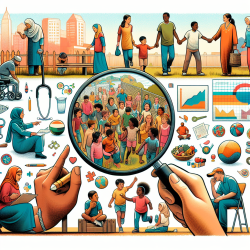Introduction
In the ever-evolving landscape of family-making, speech-language pathologists (SLPs) are uniquely positioned to support diverse family structures. The research article "Queering Reproduction in Transnational Bio-Economies" by Laura Mamo offers insights that can enrich the practice of SLPs by embracing the principles of Queer Reproductive Justice (QRJ). This framework not only challenges traditional norms but also promotes inclusivity and equity in family-making, which can have a profound impact on the outcomes of children in therapy.
Understanding Queer Reproductive Justice
QRJ is a framework that merges reproductive justice with queer politics, advocating for diverse kinship forms beyond traditional norms. It emphasizes ethical accountability and inclusivity, ensuring that all family structures are supported and valued. For SLPs, this means recognizing and respecting the diverse backgrounds and family dynamics of the children they work with, which can lead to more personalized and effective therapy interventions.
Implications for Speech-Language Pathologists
Implementing the principles of QRJ in speech-language pathology can enhance the therapeutic process in several ways:
- Inclusivity in Practice: By acknowledging diverse family structures, SLPs can create a more welcoming and supportive environment for all clients, fostering trust and engagement.
- Personalized Interventions: Understanding the unique family dynamics of each child allows SLPs to tailor their interventions to better meet the child's needs, leading to improved outcomes.
- Advocacy and Support: SLPs can advocate for policies and practices that support diverse family structures, ensuring that all children have access to equitable care and resources.
Encouraging Further Research
The intersection of QRJ and speech-language pathology is a promising area for further research. Practitioners are encouraged to explore how diverse family structures impact communication development and therapy outcomes. By doing so, SLPs can contribute to a more inclusive and equitable field that benefits all children.
Conclusion
As SLPs, embracing the principles of QRJ can lead to more inclusive and effective practices that support diverse family structures. By acknowledging and respecting the unique backgrounds of each child, practitioners can enhance therapeutic outcomes and contribute to a more equitable field. To read the original research paper, please follow this link: Queering reproduction in transnational bio-economies.










